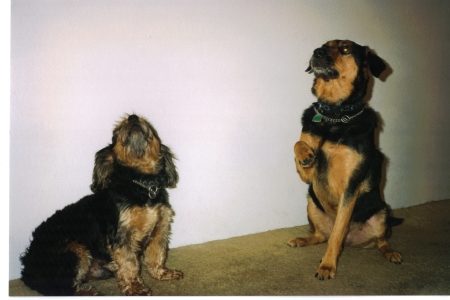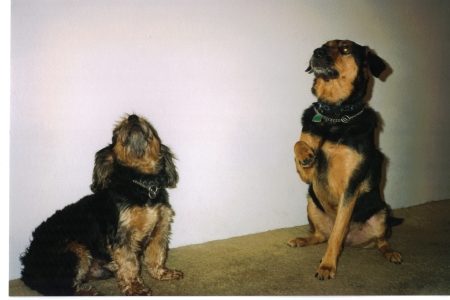

Mentor dogs
When year-old Johnny came into my life, he was a marked dog. A cairn/spaniel mix, he’d bitten little girls, mothers, trainers, dogs, trees, car tires- he was basically a wood chipper with a death wish. When his death sentence came down, I’d been moments away from adopting Chief, a fine fellow of a rough collie, sweet, wise, thoughtful; but when I learned that Johnny’s owners would commute his death sentence if and only if I alone would agree to take him on for a few weeks, I let Chief go to another family and adopted Johnny instead. I’d traded Lassie for Cujo, because I was a weak, setimental sod who saw something in the little felon. I still think of Chief; he was a great dog.
Johnny’s owner surrendered him to me, not because I was the only trainer who’d had any success with him, but because I had the great one, Lou, my wonder dog, the savant who’d helped me save hundreds of other Johnnys in his long life. Lou was tough, fair, strong and fast; he’d spent six months feral, living from garbage can to garbage can, running with a pack of canine toughs in Mendocino, CA, earning a dog doctorate in canine socialization and survival.
Compared to life in the wild, dealing with a cantankerous terrier mix was pup’s play for Lou. He was a born dog mentor, a role model with wisdom and presence who instinctively knew what another dog needed to feel welcome, to feel safe. Lou knew when to push, when to ignore, when to inspire; I barely had to do anything once Lou was on a case.
Johhny tried to bite Lou, once. He quickly found himself snug beneath 75 pounds of Rottweiler/shepherd, with strong jaws wrapped around his fuzzy little neck. A fast shake and snarl followed by a stare down and then indifference sold Johnny on the idea that, here was a dog to be respected, and listened to.
Johnny fell in love with Lou. I’d work and walk them together, and let Johnny watch while Lou worked as my assistant in obedience classes. Lou became a cult hero to the little buzz saw, whose biting habits had abruptly ended almost to the day he met Lou. On the odd chance that Johnny did try to snap at someone or some dog that Lou knew, Lou would run him down, read him the riot act, then ignore him for a few hours. Nothing I could do to Johnny could have been as telling.
Johnny learned to open up and trust because of Lou. He saw Lou’s confidence around others, and gradually realized that, whatever Lou deemed welcoming and safe must certainly be okay. Johnny would watch as strangers approaching the friendly Lou would be recieved happily; it was the balm Johnny needed to loosen up and accept the attention of others.
The presence of an older, wiser "mentor" dog in your home can make the job of raising a new dog much easier. A puppy, for instance, will almost immediately bond to the resident dog, and begin to learn the routine of the home from it. Housetraining becomes easier, as the puppy mimics the mentor dog’s habits and schedules. And obedience comes more naturally, with the puppy modeling after the mentor. The timing of walks, meals- the very ebb and flow of the home gets absorbed by the new dog through the "elder." The mentor dog will also often take charge of disciplining the youngster when needed, and will help infuse it with confidence, too, through example- if strangers met on a walk are accepted by the elder dog, for example, then the new dog will be more likely to do the same.
A mentor dog helps shape the new dog’s personality in many ways. Besides discipline and confidence building, it will help minimize the spoiling that often occurs when a puppy comes into a dogless home. Owners of multiple dogs are often what I call "natural dog owners-" they tend not to treat their dogs like trust fund babies, but rather like dogs. A durable pack hierarchy develops; the puppy knows where it stands very quickly. And a mentor dog provides a canine outlet for the newbie as well; after all, it’s vital for dogs to have regular camaraderie with their own kind, for proper socialization.
An adopted older dog can also benefit from having a mentor dog in the home, for most of the above reasons. Though brief contention over pack status can often occur between these adult dogs, it tends to get worked out quickly, leaving in most cases the camaraderie, and the confidence of having a kindred pooch around.
Of course, if the resident dog has behavioral issues, those can be passed on to the new dog as well, so it’s a good idea to work on those before bringing a new dog into the home. And if your resident dog has aggression, housetraining, or other serious behavioral issues, best to hold off on a new dog. Don’t assume a new pet will be the solution to your old pet’s shortcomings; it is rarely the case.
You and your resident dog both get something else out of this mentoring arrangement; a chance to pass on the heritage, habits, and memories of the old onto the new. When you create and maintain a chain of dogs over the decades, each one in the line retains some part of the mentor who came before- how it sits in the same spot while waiting for dinner; how it touches the back door in the same tentative way to ask to be let out; how it might even play with a special toy in the same manner the mentor dog did, years after the elder pet has passed. Behaviors and quirks get passed on, reminding us of those dogs of old. In this way, their spirits, like seeds, carry on, reminding us of great dogs gone by. I think that’s a pretty neat thing.
Join the newsletter and never miss out on dog content again!
"*" indicates required fields
By clicking the arrow, you agree to our web Terms of Use and Privacy & Cookie Policy. Easy unsubscribe links are provided in every email.